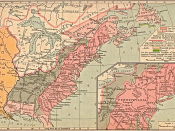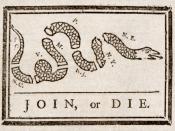SHORT PAPER #1 4
Tami Ward
Professor Donato
US History in the World
10 September 2014
Short Paper #1
When most people think of colonial America they think about the colonist breaking free from their "mother" country of England. The mindset and myth of homogeneity arose. Writings and teachings of this homogenous mindset led to ensuing generations being seen as the same way. In reality both diversity and non-diversity was present in colonial Americas. It is foolish to think of our past as one or the other. In reading ahead it will be shown how this was possible.
To understand diversity lets first explore its meaning. To be diverse is the state of having people who are different races or who have different cultures in a group or organization. When the colonists first appeared they were already made up of a diverse culture. Colonists were not a culturally homogeneous launching pad for the new nation which later received several waves of "different" immigrants.
Colonial America was a rich mixture of racial and ethnic heterogeneity. Despite their dissimilarities from one another, as separate entities most colonial settlements during their formal years were culturally homogeneous, although quickly became multicultural (Parrillo, pp. 523-545).
We must appreciate that diversity in North America was here from the start and such inconsistency makes us distinctively American. The majority of colonists were the castaways of Europe, most of who were pursuing economic, religious, and political freedom from the shackles of European governments. When they landed in America and were pushed to deal with the decidedly un-European aspects of forests, Indians, wild territory, unlimited land, and the venture to become wealthy, they developed a uniquely individualist, entrepreneurial attitude. This astonishing diversity was in large part a product of the way that colonial America was originally settled. Therefore,


